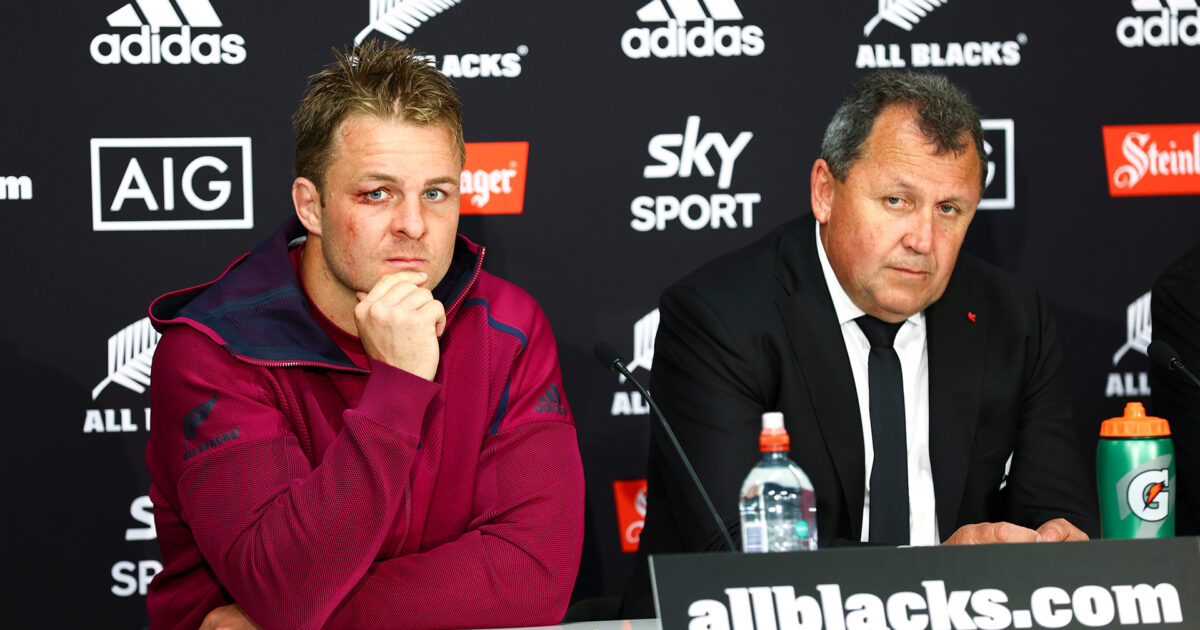'It's skill execution' - Foster looking to build from disappointing draw after missed opportunities at the death

A new era for All Blacks rugby got off to a shaky start in Wellington on Sunday, with the Wallabies holding the hosts to a famous 16-all draw. But Australia also came within a posts-width of securing what would’ve been an historic victory, with a monstrous Reece Hodge penalty just missing the target.
Not only was it the first test match for either team this year, but it was also Ian Foster and Sam Cane maiden test since taking the reigns of the national side as permanent coach and captain respectively.
After the nearly 90 minutes of rugby, both Foster and Cane were clearly disappointed with the result – with the Captain carrying the wounds of the test with him into the post-match press conference.
James O’Connor put plenty of pressure on the All Blacks late but kicking a penalty with just over five minutes to play, before Jordie Barrett cancelled it out with a penalty of his own in the 79th minute. After the missed Hodge penalty, the rugby in stoppage time would’ve had all rugby fans on the edge of their seat, with both teams having chances to win the test.
https://www.instagram.com/p/CGOi-bOA2nJ/
When the sound of the siren was a distant memory, and with the scores still locked, the All Blacks had the ball inside the Australian 22 with a drop goal looking like a potential option. But instead the All Blacks continued to attack, and it nearly paid off for them.
While they didn’t get the points they were after, Foster is taking plenty out of those final few moments.
“I thought we calmed ourselves down, we were well set up under the goalposts. You’ll see Richie [Mo’unga] was hovering around in that position but Jordie [Barrett] called the ball and it was actually a pretty solid decision in its own because George Bridge was pretty well unmarked out the side,” Foster said.
“It’s skill execution, we just couldn’t quite get the ball out where it needed to be. That hurts.
“It’s a message to us all that test rugby is back and if you’re not good enough in those big moments, then you don’t get what you want.”
Another key moment that Foster refused to blame the result on came on the stroke of half-time, with centre Rieko Ioane dropping the ball over the line with no defenders near him.
The All Blacks led by five points at the time, but Ioane decided to put the ball down with one hand. The hosts could’ve potentially have led by as much as 12 going into the break.
“It would’ve been useful. He’s feeling pretty frustrated with himself but that’s one of those little lessons that players have to go through and I thought he had a reasonably strong game apart from that.
“That’s why they’re called test matches, you’ve got to take those little moments and when you get a little slopping, it can come back and bite you.
“You can’t dwell on errors in test matches, there’s a whole lot of errors before that and a whole lot of errors after that, but there’s certainly some learnings.
“Part of international rugby is that you make an error and you move on. He’s a confident young man and he’s got to learn from that one little thing, but he can also focus on the whole lot of good things he did in that game too.”
What did you think of that NO TRY decision? #BledisloeCup pic.twitter.com/aXzd26rvEH
— Sky Sport NZ (@skysportnz) October 11, 2020
Cane was particularly impressive for the All Blacks, making 26 tackles and securing two turnovers with his work around the breakdown. It was a tough night for the men in black jerseys, who were made to make over 100 more tackles than their opponents in the first Bledisloe Cup test.
“In test matches, you can’t be defending the whole time. It’d be quite nice to apply a wee bit more pressure with the ball and I think that will be an area of focus for us this week,” Cane reflected.
“I’m also really proud of the desire, the attitude at the end, the willingness to keep playing.
“Lots of emotions but as buggered as you are after a test match like that and a result like that, I’m already looking forward to the next one.”
The result sees the equation for the Bledisloe Cup effectively changing for both teams, with the series now going to a best of three format.
Auckland will host the next test on the 18th at Eden Park, at place the Wallabies haven’t beaten the All Blacks at since 1986.
“The Bledisloe is important for us and this test showed where both teams are at, and both teams will walk away with a lot of positives and a lot of stuff that they’ll think that they can go and do better next week.
“It bodes for a great series, and hopefully that gets people excited but we can’t wait for Eden Park now. We’ve got a job to do and Eden Park is pretty special for us and we want to play well up there, and we’re going to have to.”










































































